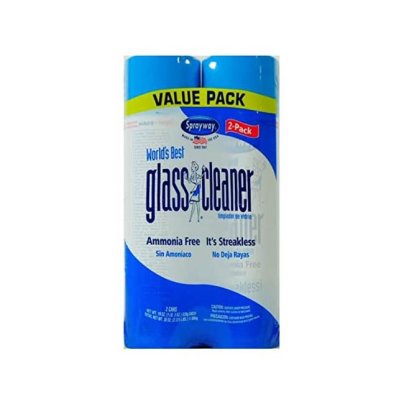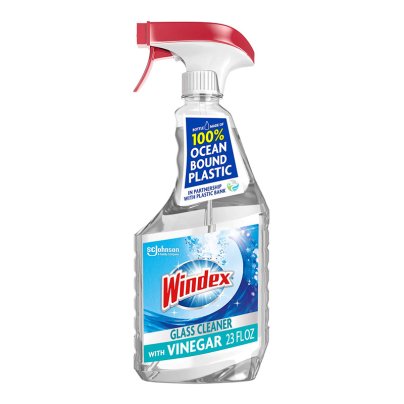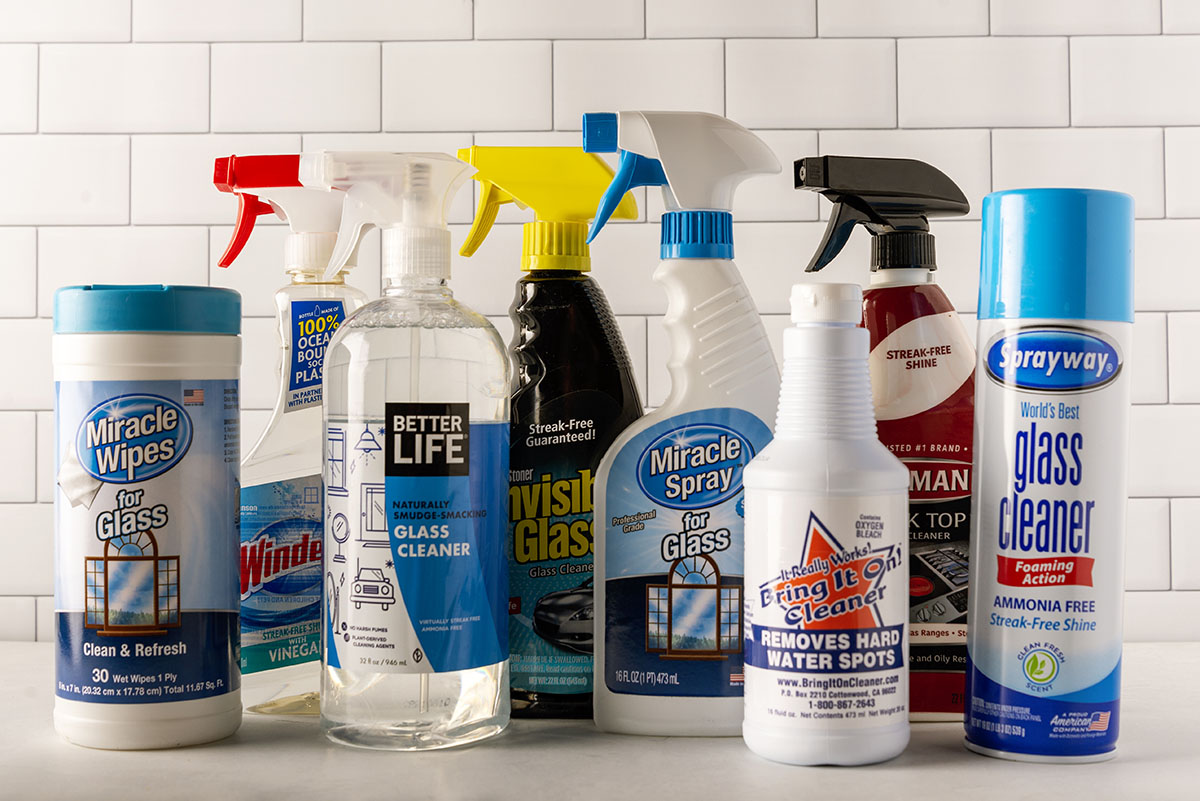
We may earn revenue from the products available on this page and participate in affiliate programs. Learn More ›
Cleaning glass is an easy housekeeping chore to skip—that is, until all you see are streaks of grime, islands of dust, and dirty fingerprints. Don’t let things go that far. Regularly wiping down windows, mirrors, and other glass surfaces gives your home a polished, well-cared-for look.
Though some might prefer to make their own glass cleaner, many people turn to the convenience of buying it ready to use. There are many formulas, ingredients, and uses that can make choosing a solution trickier than you might expect. We tested some of the best glass cleaners on the market. Use the guide below to navigate the options and select the best glass cleaner for you.
- BEST OVERALL: Sprayway Glass Cleaner Aerosol Spray
- BEST BANG FOR THE BUCK: Windex with Vinegar Glass Cleaner
- BEST FOR VEHICLES: Invisible Glass 92164-2PK Cleaner and Window Spray
- BEST WIPES: MiracleWipes for Glass, Streak Free Cleaning Wipes
- BEST FOR SHOWER DOORS: Bring It On Cleaner Hard Water Stain Remover
- BEST FOR STOVETOPS: Weiman Stove Top Daily Disinfecting Cleaning Spray
- BEST FOR MIRRORS: MiracleSpray for Glass Includes Microfiber Towel
- BEST MULTISURFACE: A J Funk & Co 20515 Sparkle Commercial Glass Cleaner
- BEST NATURAL: Better Life Natural Streak Free Glass Cleaner
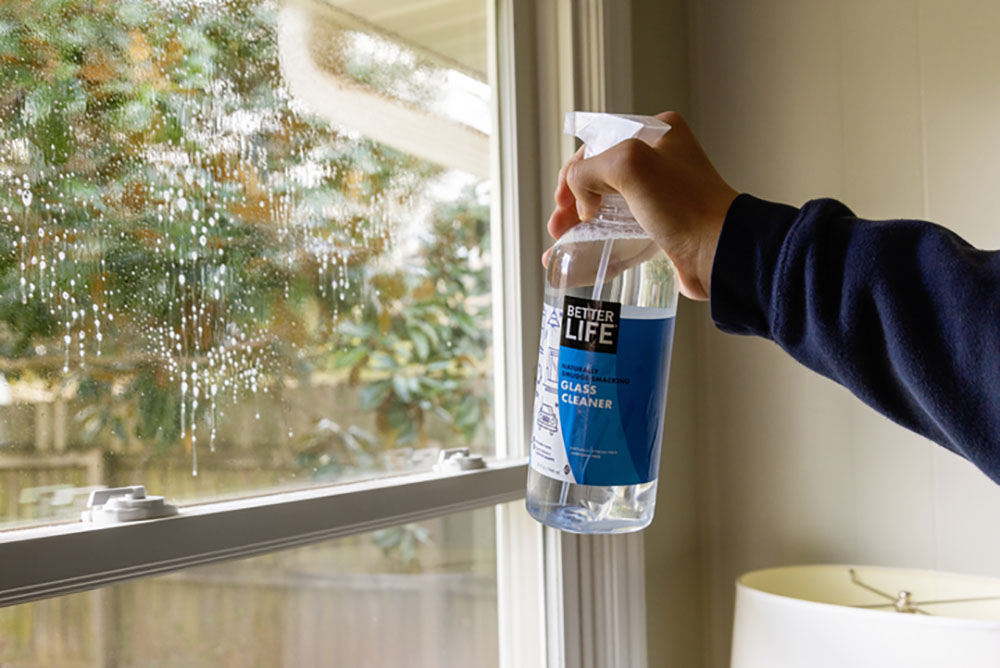
What to Consider When Choosing the Best Glass Cleaner
Glass cleaner might not seem like the most complex product, but it helps to consider a few things when shopping for one. Available in various forms with a variety of ingredients, both chemical and natural, selecting the right glass cleaners mostly involves choosing a product that’s effective and easy to use.
Liquid, Foam, and Wipes
Glass cleaner comes in three basic formats:
- Liquid glass cleaner is the most familiar type and the handiest for everyday use around the home. Most liquid glass cleaners come in spray bottles, although a few are packaged in aerosol cans. Some attach to a garden hose for cleaning outdoor windows. To prevent the liquid cleaner from running down vertical glass surfaces and dripping onto the furniture or floor underneath, it’s best to mist these cleaners onto a cleaning cloth, preferably microfiber, which won’t leave lint on the glass. Then, wipe the glass with the cloth for a streak-free and mess-free experience.
- Foam glass cleaners, which usually come in aerosol cans, often make up extra-strength products designed to effectively tackle the toughest stains and glass grunge, such as bird droppings on car windows, watermarks on shower doors, and dried toothpaste globs on bathroom mirrors. Because foam clings, there’s less worry about cleaner dripping down surfaces, which allows you to spray the product directly onto the glass and then wipe with a microfiber cloth.
- Glass cleaning wipes are use-and-toss products that make light household cleaning a snap. Though convenient for quick touch-ups, they generally work less effectively than liquid or foam cleaners for greasy, sticky, or thick messes. Wipes also tend to leave more streaks and can dry out quickly if a user fails to reseal the package correctly after use.
Active Ingredients
Most commercial glass cleaners have a fairly lengthy list of chemical ingredients with various functions, but for most consumers, these products fall into one of two general camps: those with alcohol or ammonia as their main active ingredient and those with gentler, “greener” active ingredients.
Ammonia
Ammonia is one of the most common and inexpensive active ingredients in traditional window cleaners, because it effectively cuts through grease, dirt, fingerprints, dried cooking spills, and other typical glass grunge, while also killing some germs. It even evaporates quickly, leaving behind a streak-free surface.
The downside? Ammonia can irritate the respiratory system, skin, eyes, and throat. Using an ammonia-based cleaner in a small, closed space such as a bathroom can lead to coughing and discomfort in the throat and chest. Breathing in large quantities of ammonia can lead to chemical pneumonia.
Spilled on skin, ammonia can cause chemical burns, and a splash in the eyes can potentially blind a person. Still, for most people without existing respiratory sensitivities, use of ammonia-based glass cleaners as directed and with good ventilation (open windows and doors with nearby fans on) is unlikely to do any harm.
Alcohol
Isopropyl alcohol (IPA), more commonly called rubbing alcohol, is another common active ingredient found in window cleaner. Like ammonia, it effectively cuts through grease and other tough grunge, evaporates extremely quickly, and kills many types of germs.
Although isopropyl alcohol likely will not cause harm if used correctly and with proper ventilation, it is potentially toxic if consumed, sprayed into the eyes, or spilled in large quantities onto the skin, where it quickly absorbs and can cause symptoms such as dizziness, rapid heartbeat, slowed breathing, confusion, and nausea.
Other Active Ingredients
- Cleaning agent glass cleaners, designed to break down components like grease or hard water deposits, are formulated for specific jobs. Solvents, such as ethylene glycol monobutyl (EGBEA), are found in cleaners designed for use on glass induction stovetops because they dissolve greasy splatters. Likewise, glass cleaners intended for shower doors contain ingredients that dissolve soap scum and remove water spots.
- White vinegar is perhaps the most common active ingredient in natural commercial glass cleaners and also homemade window cleaners. Vinegar effectively cuts through grease and grime, and although it doesn’t have a pleasant smell, it’s not likely to irritate the respiratory system, eyes, or skin the way ammonia and alcohol can. Because vinegar evaporates fairly quickly, it leaves a mostly streak-free finish. While it’s not as powerful as ammonia and alcohol, vinegar has mild antibacterial properties that can kill germs.
- A variety of plant-based active ingredients, such as thyme, eucalyptus, pine, and mint may go into today’s totally nontoxic and sometimes pleasant-smelling household glass cleaners. Generally sufficient for general cleaning around the house, they often aren’t as tough on grease, dried toothpaste, and other heavy-duty grunge. Additionally, their antibacterial abilities aren’t as strong compared to other types of cleaners.
Specialty Glass Cleaners
Some surfaces require specialty glass cleaners. Any type of glass cleaner is safe to use on untinted windows, mirrors, glass shelves and tables, glass shower doors, and tile, but some surfaces call for specially formulated cleaners.
- Because today’s electronics have screens made of multiple layers of very thin plastics and adhesives, not glass, they are susceptible to damage from cleaning products containing alcohol or ammonia, which can cause haze or discoloration. Only use cleaners that specifically indicate they are safe for eliminating dust and fingerprints from televisions, computers, phones, and other delicate electronics.
- While regular glass cleaner will work on the insides of untinted automobile windows, if you’re battling bird droppings, heavy layers of dust, pollen, mud, or sticky tree sap on the exterior, you’ll get better results with a cleaner specifically formulated for tough messes common to windshields.
- To reduce elbow grease when cleaning the outside of your home’s windows, choose a glass cleaner in a spray bottle that attaches to your outdoor hose, allowing you to spray the glass quickly and evenly and then rinse away the grime with no need for scrubbing.
- For tinted windows, choose an ammonia-free glass cleaner, as ammonia can discolor tints. These products are also safe for chrome, stainless steel, plastic, vinyl, and sealed tile.
- If you have UV-resistant film on your home’s windows, check the manufacturer’s guidelines before reaching for a cleaning product, as these films can be damaged by vinegar, ammonia, and other chemicals often found in commercial cleaning products.

Our Top Picks
With those shopping considerations in mind, choose a glass cleaner from among these recommendations that will best suit your needs. We’ve tested all the products on various glass surfaces. The best glass cleaner should clean glass surfaces with a minimum of scrubbing, leave a streak-free finish and, in the case of multisurface glass cleaners, effectively clean and shine other nonporous surfaces as well.
Best Overall
Sprayway Glass Cleaner Aerosol Spray
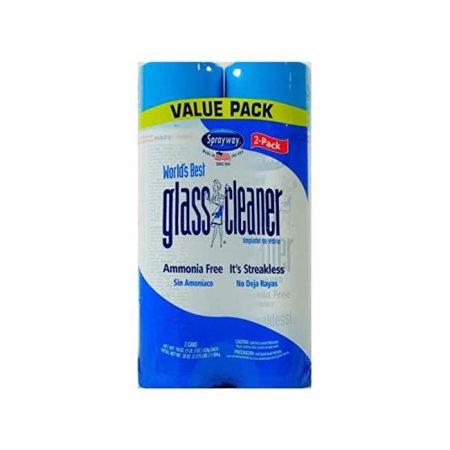
Pros
Cons
Product Specs
- Format: Aerosol spray
- Active ingredient: Alcohol
- Fragrance: “Clean” scent
This versatile foaming aerosol glass cleaner, with the active ingredient 2-butoxyethanol, is great on mirrors and windows and also shines up stainless steel, chrome, tile, porcelain, enamel, manufacturer-tinted windows, stone countertops, and greasy stove hoods. The thick foam clings to vertical surfaces, so there are no puddles or drips to worry about when cleaning the refrigerator door, living room windows, or bathroom mirror. Sprayway glass cleaner is powerful, multipurpose, and inexpensive, making it great for both professional and at-home use. This aerosol formula comes in a two-pack, each with 19 ounces of cleaner.
During testing, we liked how easy it was to spray the cleaner’s thick foam evenly over surfaces. We allowed it to sit for several seconds before wiping it away, and it did not run. Overall the spray cleaned glass surfaces remarkably well. It also did a great job removing dust and greasy spray from other non-glass surfaces. The only con to the cleaner was its smell, which wasn’t horrible but smelled more chemical-like than refreshing.
Get Sprayway glass cleaner on Amazon, at Walmart, or at Target.
Best Bang for the Buck
Windex with Vinegar Glass Cleaner
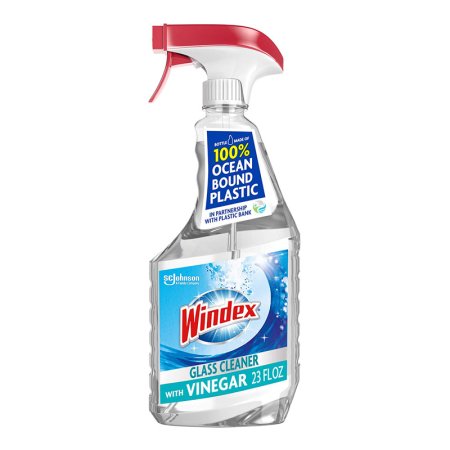
Pros
Cons
Product Specs
- Format: Spray
- Active ingredient: Alcohol/Vinegar
- Fragrance: Slight vinegar scent
This vinegar-based cleaner leaves a streak-free shine on windows, mirrors, and appliances, and it comes at an attractive price point. In conjunction with Windex’s goal of reducing landfill waste, the plastic bottle that holds this multisurface cleaner is made from 100 percent recycled plastic. Since this eco-friendly cleaner doesn’t contain ammonia, there’s no lingering chemical odor. While this Windex vinegar cleaner works like a charm to remove smudges and fingerprints from glass, it can also safely clean television and monitor screens as well as many other surfaces, so users can buy one product to handle a range of surfaces.
Although using vinegar to clean could leave an overwhelming sour smell behind, we didn’t have that issue with this vinegar cleaner. We also found that the spray did an excellent job cleaning all types of glass surfaces, but it did leave some streaks that required buffing with a dry paper towel. Overall, we found this glass cleaner to be a good, economical option to keep on hand for routine cleaning.
Get the Windex with vinegar glass cleaner on Amazon, at The Home Depot, or at Walmart.
Best for Vehicles
Invisible Glass 92164-2PK Cleaner and Window Spray
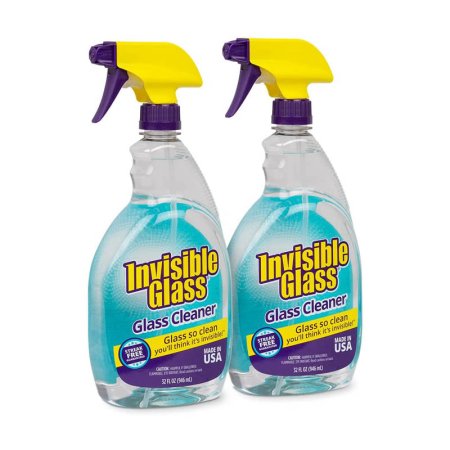
Pros
Cons
Product Specs
- Format: Spray
- Active ingredient: Alcohol
- Fragrance: None
From dead bugs and bird droppings to pollen and dirt, car windows get hit with a ton of stuff that leave behind a big mess. All that grime not only looks bad but also reduces visibility, causing a major safety hazard. This no-ammonia glass cleaner is formulated specifically to remove tough messes from car windows, including tinted ones. Available in a two-pack, with each spray bottle holding 22 ounces of cleaner, shoppers have a great opportunity to stock up.
We primarily tested this glass cleaner on windshields and exterior windows. It easily lifted dirt, pollen, and bird droppings with little soaking or scrubbing. We found that this cleaner was best paired with a microfiber cloth that would absorb more dirt and debris, and help buff away extra product as it cleaned.
Get the Invisible Glass cleaner on Amazon and at Walmart.
Best Wipes
MiracleWipes for Glass, Streak Free Cleaning Wipes

Pros
Cons
Product Specs
- Format: Wipes
- Active ingredient: Alcohol
- Fragrance: None
Reach for these convenient MiracleWipes whenever household surfaces need a quick touch-up. These ammonia-free wipes remove fingerprints and other glass grunge fairly effectively from mirrors, windows, sealed stone countertops, bathroom sinks, auto glass, and more, and are perfect for storing in the car to wipe away your dog’s nose prints from a window after an outing. Overall, for versatility and convenience, MiracleWipes are top-notch, and they won’t irritate skin. They come in a resealable container with 30 wipes and may include a microfiber towel (depending on retailer) for buffing glass to a high shine after cleaning.
MiracleWipes did an excellent job of cleaning up dirt and dust from exterior windows. We liked that the package was recyclable and is small enough to easily stow in a car for on-the-go cleanups. We noticed that the wipes held a lot of cleaning product, so the microfiber towel was handy for absorbing excess cleaner. That said, the extra-wet wipes did make it easier to remove dried-on debris.
Get MiracleWipes glass cleaner on Amazon or at Walmart.
Best for Shower Doors
Bring It On Cleaner Hard Water Stain Remover

Pros
Cons
Product Specs
- Format: Cream/paste
- Active ingredient: Sodium bicarbonate
- Fragrance: Mint
Glass shower doors are notorious for becoming cloudy with soap scum or hard water deposits, but Bring It On Cleaner for shower doors is tough enough to cut through the haze. With the addition of oxygenated bleach, this high-powered cleaner dissolves hard water deposits and leaves glass clean and clear. It also works to remove accumulated stains on tile, grout, and faucets, giving the entire shower or tub a fresh new look. With frequent use, this cleaner can keep grime and hard water deposits from forming in the first place, eliminating the need for heavy scrubbing.
Buyers receive a 16-ounce bottle of Bring It On cleaner and four rugged nylon scrubbing pads that attach to a standard drill for powering away even hardened-on deposits and stains. In testing, we found that the cleaner did a remarkable job getting rid of soap scum off of glass shower doors, tiles, and tubs. We liked the bonus nylon scrubs that made removing stubborn stains and caked-on soap scum even easier. Because the cleaner was only intended to be used for cleaning baths and showers, it required a lot of water to rinse. As such, it wasn’t terribly useful for mirrors or windows. Also, we thought that the mint scent, though not overpowering, smelled odd.
Get Bring It On glass cleaner on Amazon and at Walmart.
Best for Stovetops
Weiman Stove Top Daily Disinfecting Cleaning Spray
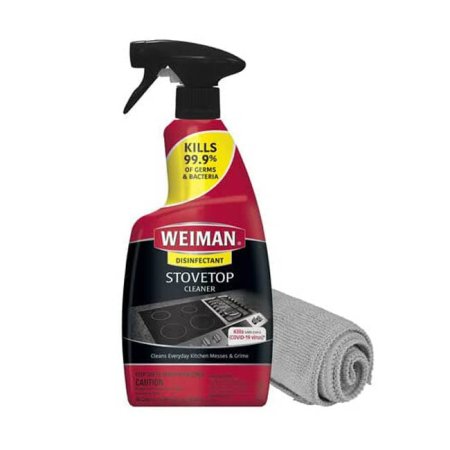
Pros
Cons
Product Specs
- Format: Spray
- Active ingredient: Butoxyethanol/sodium hydroxide
- Fragrance: Fresh linen
Glass and ceramic cooktops are always in vogue because they offer a single flat cooking surface that wipes clean without the need to remove burners or clean gunk from tiny nooks and crannies. However, cooking on the stove can leave behind oily and sticky splatters that require a tough but nonabrasive cleaner. For those looking to get a glass cooktop sparkling clean, look no further than Weiman’s daily cleaner. This spray-on cleaner comes in a 22-ounce bottle and features a formula that dissolves grease and grime without scratching or marring delicate glass surfaces. For the best results, give the induction range a quick spritz with Weiman’s cooktop cleaner after every use and wipe away with the soft, microfiber rag that comes with this purchase.
We have tested several Weiman cleaners, and like the others, the cooktop cleaner performed exceptionally well. It quickly removed grease and other cooking debris with ease, however, it did not remove cooked or burnt-on food. Overall, we found that Weiman’s cooktop cleaner was excellent for quick cleaning after cooking and worked as it was intended to, as a great everyday maintenance cleaner.
Get the Weiman stovetop cleaner at Target, on Amazon, or at The Home Depot.
Best for Mirrors
MiracleSpray for Glass Includes Microfiber Towel
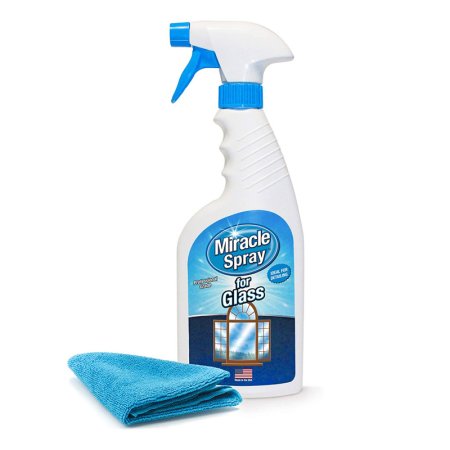
Pros
Cons
Product Specs
- Format: Spray
- Active ingredient: Isopropyl alcohol
- Fragrance: None
Enjoy a smudge-free reflection when applying makeup or just admiring a new outfit in the mirror when using MiracleSpray. MiracleSpray comes in a 16-ounce spray bottle, and buyers receive a microfiber towel to get them started buffing those mirrors to a streak-free shine. The glass cleaner removes fingerprints, smudges, grease, and more. It’s made to dissolve residue at a molecular level, so it wipes away with ease. Use the glass cleaner to shine up more than mirrors; it’s suitable for cleaning windows, light fixtures, reading glasses, and shower doors, in addition to giving appliances a clean, fresh shine. It alsos leaves a protective film to keep the surface fingerprint resistant between cleanings
We used paper towels to wipe away the cleaner from mirrors and windows in our first test. It left behind dust particles from the paper towels and streaks. However, the streaks evenly disappeared once they dried. We then followed the cleaning instructions on the bottle, which instructed us to spray the cleaner on a microfiber towel first and then wipe the glass surface. This process worked significantly better.
Get MiracleSpray glass cleaner on Amazon.
Best Multisurface
A J Funk & Co 20515 Sparkle Commercial Glass Cleaner
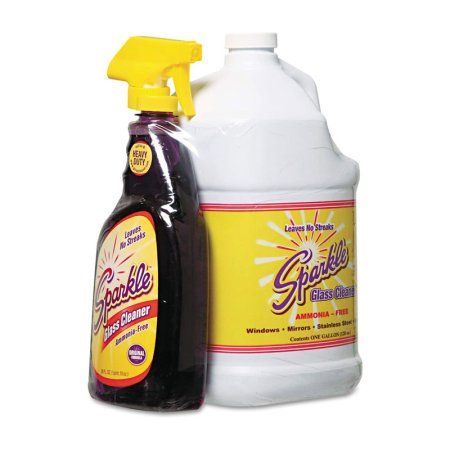
Pros
Cons
Product Specs
- Format: Spray
- Active ingredient: GlycolEB
- Fragrance: Generic “clean” scent
Remove fingerprints from stainless steel appliances and leave a clear, streak-free shine on windows and mirrors with Sparkle glass cleaner. This product, which comes as a purple liquid in a 33.8-ounce spray bottle, also includes a 1-gallon refill bottle. Sparkle rapidly dissolves spots and quickly dries without smearing or streaking, for cleaning virtually all nonporous surfaces in the home. Plus, Sparkle is ammonia-free with no abrasives, so it’s safe to use on computer, phone, tablet, and television screens as well as eyeglasses.
In testing, we found that Sparkle glass cleaner effectively cleaned windows, chrome, ceramics, stainless steel, and hard surface flooring. It dried almost instantly, leaving no streaks or excess product on the surfaces. The only downside to the cleaner was its strong chemical scent.
Get Sparkle glass cleaner at The Home Depot or on Amazon.
Best Natural
Better Life Natural Streak Free Glass Cleaner
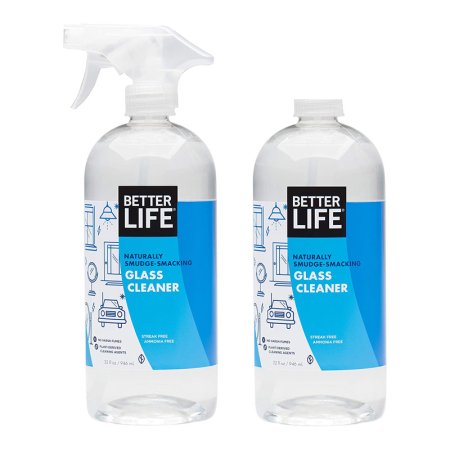
Pros
Cons
Product Specs
- Format: Spray
- Active ingredient: Plant oils
- Fragrance: None
Better Life contains no alcohol, solvents, dyes, or synthetic fragrances. Instead, it’s made from plant-derived cleaning agents extracted from coconut, corn, and palm kernel, so it’s safe to use around pets and children, and it won’t harm the environment. Even without chemicals, Better Life is a powerful cleaner that’s designed to remove smudges and residue from mirrors, windows, light fixtures, and more. Each order includes two 32-ounce spray bottles.
We found that the natural cleaner performed remarkably well on glass surfaces with average dirt, debris, and smudges. It did not effectively clean sticky residue from a glass surface without help from a microfiber towel and elbow grease. However, for routine window and mirror cleaning, we found that it worked just as well as other cleaners.
Get the Better Life glass cleaner on Amazon or at Walmart.
Our Verdict
Sprayway Glass Cleaner came in as our top pick because of its versatility and how its thick foam coats evenly over surfaces, allowing the cleaner to penetrate tough stains and dirt. It worked extremely well on indoor and outdoor glass surfaces, and wiped away clean, leaving a streak-free surface. Also consider Windex with Vinegar Glass Cleaner for routine glass cleaning at an economical price.
How We Tested the Best Glass Cleaners
We tested the glass cleaners according to an established rubric that included how well it cleaned the glass and other surfaces, and if it wiped away cleanly and streak-free. We rated the sprays on a scale of 0 to 4 to determine their score.
First, we sprayed each cleaner on the surface that it was primarily designed to clean and used paper towels to wipe the surface dry. We noted how evenly the product sprayed, how much it dripped, how well it wiped away, and if it left any streaks. Then, we applied the product to other surfaces (if applicable) and repeated the test. We also tested the product to see how it removed greasy fingerprints and other tough accumulated dust, dirt, and other debris.
FAQs
Glass cleaners remove smudges and debris that can cloud windows and mirrors without streaking, but they’re not all created equal. Some contain chemicals, while others feature only natural ingredients, and most are well suited to cleaning other nonporous items in the home. For those who want the cleanest, freshest shine, some questions are to be expected.
Q. What is the best glass cleaner?
The best glass cleaner can vary depending on its intended use— meaning, the cleaner for a glass cooktop isn’t the best choice for a mirror. For general glass cleaning, however, the best overall option in the above lineup is Sprayway Glass Cleaner, a versatile foaming aerosol glass cleaner that works on mirrors and windows and also shines up stainless steel, chrome, tile, porcelain, enamel, manufacturer-tinted windows, stone countertops, and greasy stove hoods.
Q. What do professional window cleaners use to clean windows?
Professional window cleaners use a variety of cleaning solutions, and Sparkle Glass Cleaner is a frequent choice. Professionals clean windows a bit differently, though; they spray the cleaner on the window and then use a razor scraper to remove every last trace of haze or residue before wiping the glass to a nearly perfect shine.
Q. What is the best thing to clean windows with?
For a streak-free surface, spray windows with a good-quality glass cleaner and then wipe until dry with a clean, soft cloth. Microfiber towels work well for buffing windows to a spotless shine, and the pros sometimes use newspapers as well.
